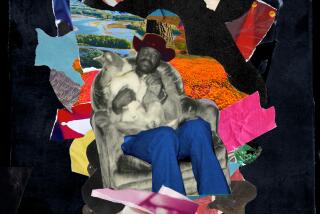Man in White by Johnny Cash (Harper & Row: $14.95; 288 pp.)
- Share via
The man in black has written “Man in White.” Johnny Cash’s first novel, a story of religious conversion, significantly parallels the transformation in the country singer’s own life.
Cash’s story is well-known. His career began in the ‘50s as a rockabilly pioneer alongside Elvis Presley, Jerry Lee Lewis, and Carl Perkins. By the time he hosted his own network television show in the early ‘70s, his success and his struggle were public knowledge.
Cash chronicled his oft-troubled life in his autobiography “Man in Black” (Zondervan, 1975). The honest self-portrait describes the earliest months of his “spiritual odyssey” and the genesis of what has become nearly a dozen years of dedicated biblical study.
Attracted to the one man he believes to be “invincible,” Cash chooses the Apostle Paul for his hero. Cash is moved by the surprisingly few verses of scripture that describe the events surrounding Paul’s dramatic conversion to Christianity. That shortage of verses becomes the author’s inspiration.
Cash fictionalizes the three years before and three years after Paul’s visionary encounter with Jesus, the “Man in White.” Cash says, “No event short of the birth of Jesus Christ himself has affected the life of humankind on this earth as powerfully as the commands given and accepted in that one minute.”
According to Cash, Saul was a staunchly religious Jew who was deeply alarmed by the followers of Jesus. To him, these converts were breaking the most sacred laws of Judaism. He zealously, even violently, pursued their suppression. But, while traveling to Damascus for the purpose of prosecuting these defectors, Saul himself is converted by his vision and Paul, the Apostle, is born.
Cash talks in his introduction of discovering Paul’s compelling character and personality. Regrettably, “Man in White” is not that compelling. Neither Paul nor his times truly come alive via Cash’s storytelling.
The author’s sincerity is evident, and his devotion to historical authenticity is commendable. If the reader considers Cash’s powerful identification with Paul, then the “Man in White,” together with his autobiography, does give us some insight into the convictions of the man in black. However, the essence and eloquence of that man can still be best discovered through his music.
More to Read
Sign up for our Book Club newsletter
Get the latest news, events and more from the Los Angeles Times Book Club, and help us get L.A. reading and talking.
You may occasionally receive promotional content from the Los Angeles Times.










